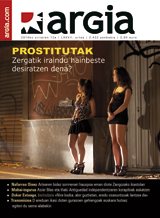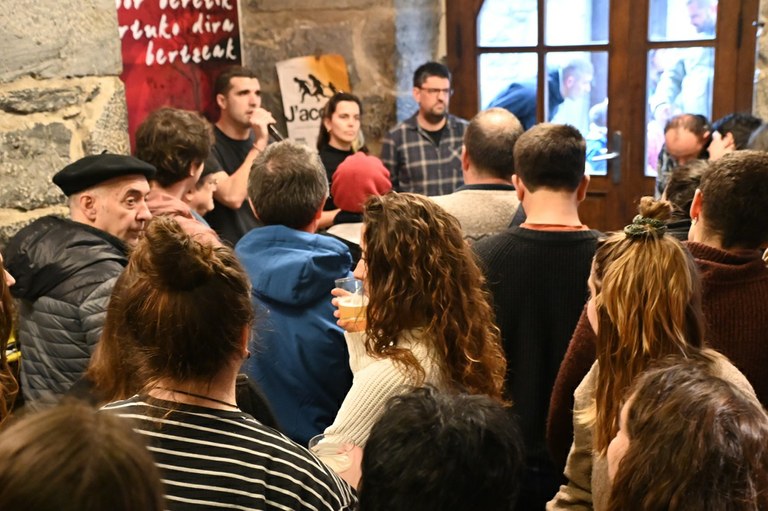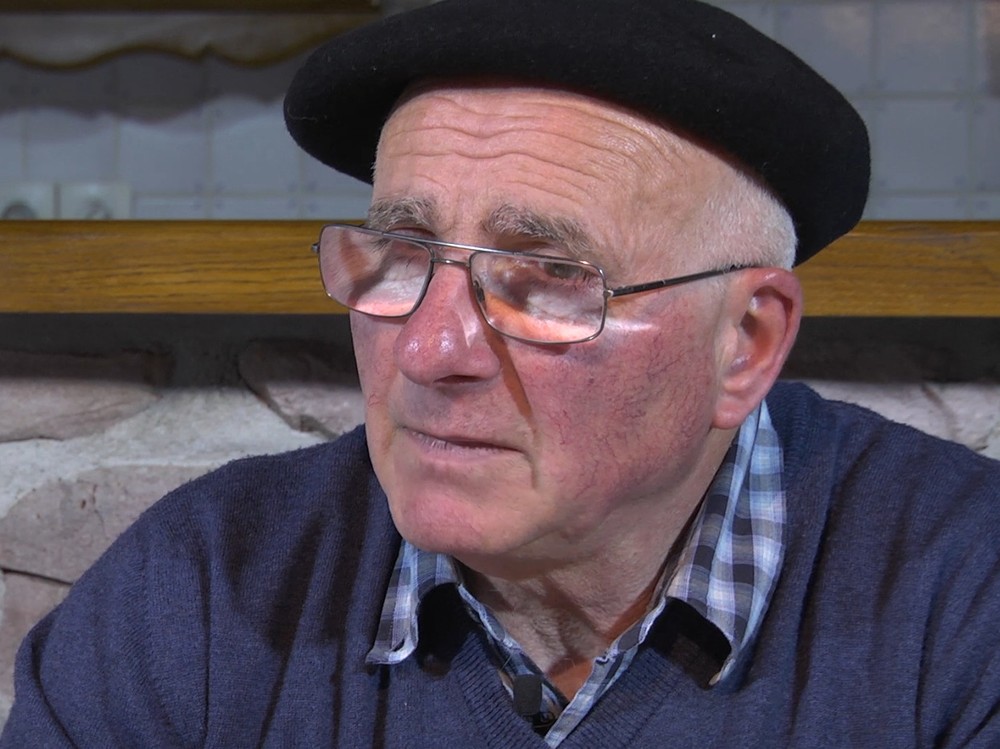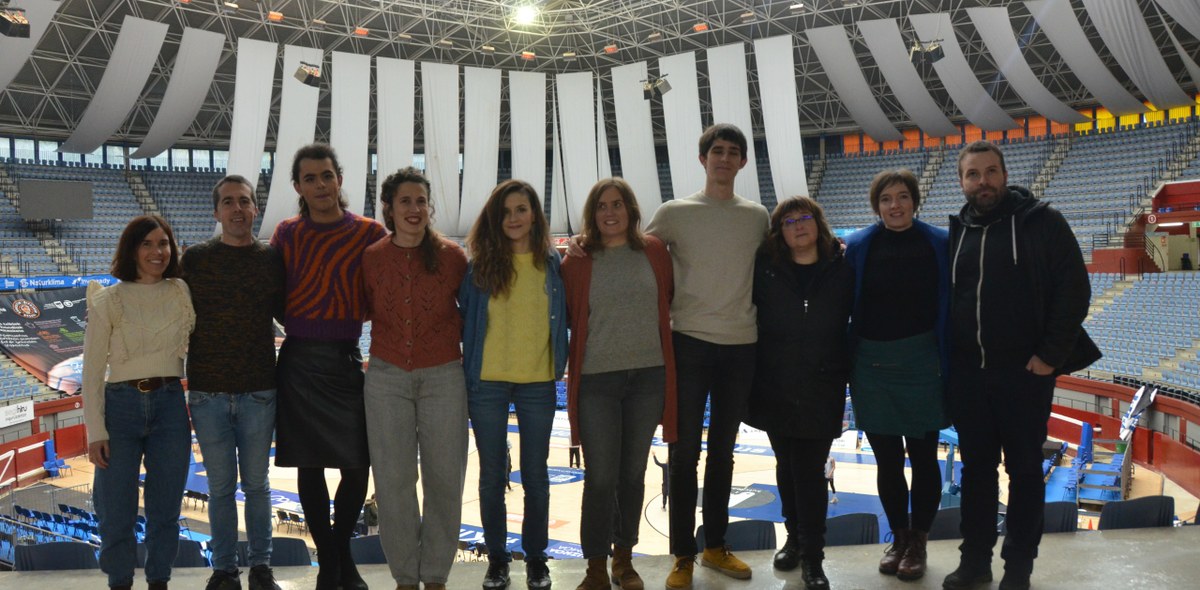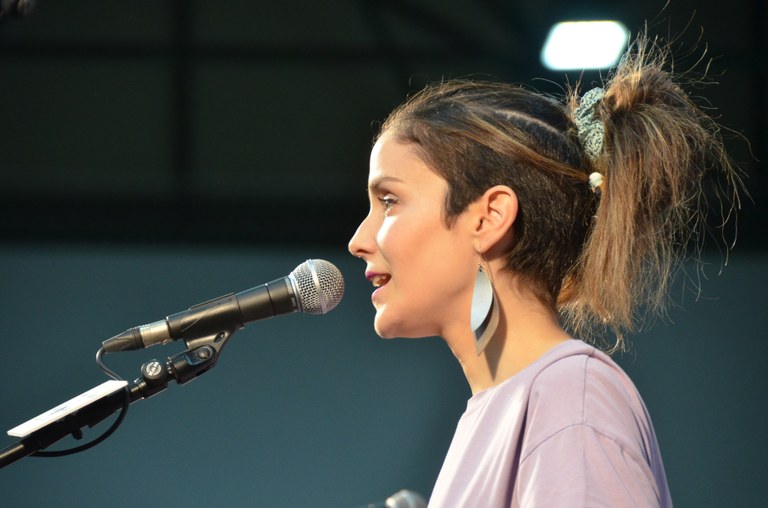"Bertsolarism is a new mass"
- “I don’t know what I want to be when I grow up.”
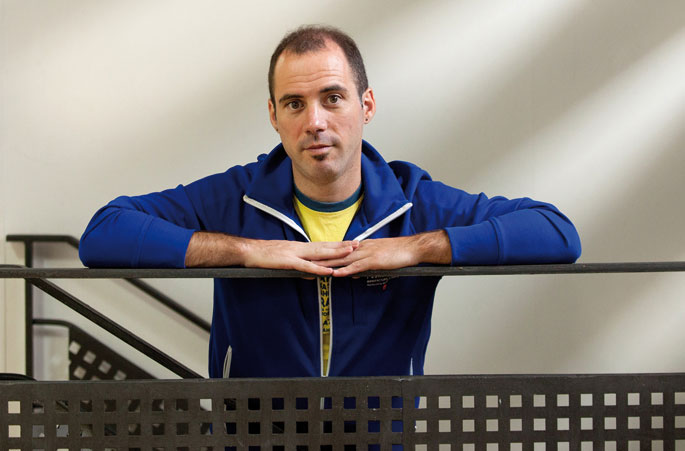
You're a young man in town.
I was there until I was 14, almost without leaving the village. We lived with grandparents and grandmothers, surrounded by animals: pigs, goats, chickens, cats… Today there are still cows. In 14 years, the teacher told my parents that I could do high school, and although I could do vocational training, my mother arranged everything to send me to study in Pamplona. He lived indoors at the seminary school. This was a tremendous change. From the Vascophony “heidistica” area to the headquarters of 50 boys from all over Navarra in Pamplona. It was pretty hard. Accustomed to the hollowed company, I had to work in a short time many resources for human relations.
What was Bertso Eskola for you?
It was a real oasis in this strange new atmosphere. I started at Betelu's bertsos school from a young age, and then I came to Iruñea and went on with Manu Gómez who was here. It was then for me the almost unique Basque centre in Pamplona.
Do you love bertsos from a young age?
Yes. A neighbor, Ramon de Matxindo, was very fond and I followed him. When I was 12 years old, she was over 50, and she was happy that I would talk to him. My grandfather also loved verses. Also in school we had a very fond teacher to the bertsos.Nos put the sections of the Hitzetik Hortzera program and we listened to the bertsos, we knew the old bertsos, we did rhymes… In ball it was normal, in football I did not have the ball and in bertsolarism it was good, to say the least. At the age of 14, I won the Navarra School Championship. At that time we left Ekintza Landa, Nerea Bruño and other young people, along with those who were somewhat older than us: Xabier Silveira, Estitxu Arozena, Estitxu Fernandez… And there were also old ones, still from the old classical world. A very special mixture.
Have you been the first bertsolari to come onstage with dyed purple hair?
Maybe! There have been different phases in my life. At first, I felt a lot of pity for having to leave the village, for breaking the classical world. The second phase, however, was not wanting to know anything about that world. Rebellious era, dyed with purple hair, start playing rock music and guitar in a heavy group... At that time we made the crew in the gaztetxe of Lekunberri and there we felt very identified. I went to Bera to do UBI and after repeating myself twice I decided to do Magisterium, because that allowed me to continue in Pamplona in the association of bertsolaris, working with singers, with music and with batukada. Then came the wave of electronic music and I was putting music a little longer. I moved a lot, in an underground environment. In Pamplona and above all in Lekunberri. Many hours of meetings, of projects, of essays… and what we always heard was that that was no use at all. But our instinct, our instinct, was going around. And we learned a lot in the organization and in defining goals, for example. The lessons that have later served us. When we put that crew together, we always end up talking about those years. The truth is that in those years, the culture of the street changed a lot.
Now have you reconciled with the dwelling?
Especially when I have to go to work. Yes, and also with people from rural backgrounds. For many years they have not coincided with some of my decisions, for example when I made apostasy, but now I believe that young people have placed us in a very privileged position. That's what I have to thank a thousand and a million times. And we, instead of fighting against it, have to complete that process, as we see fit. So far, the main concern has been that we had to eat, that we didn't get cold and that we had studies, and all of that has been achieved by our seniors, who have been sweating a lot. They have succeeded in getting us to live well and it is now up to us to manage all this and also to decide culturally how we stand in the world. I have realized that it is an important challenge and has a thousand edges: you have to see the attention given to emotions, what we do with food… The classical farmhouse model is very united. Leisure is ours, the first generation of free time, for example. Until now it is difficult to maintain, because today the model has been done little and has been taken much, but from the classical world there are bases that can be very important for the future: to do common work for the people, assemblies, auzolan… That is a great model.
In this sense, do we in Euskal Herria have more relationship with the land than in other places?
At least, we have it closer. We can take high doses of city and then supplement them with some popular doses. That in Euskal Herria is very enriching to maintain our internal balance. Another example may be that, fortunately, many producers are betting on the eco-friendly, and not just on fashion. It underlies the process of feeding and wanting to live as the cycles of nature are, connecting itself with its emotions and its environment.
You have been a young rebel. How do you see today's youth?
There have been many changes and we are now living in a very different situation. So the social objectives, the level of education, the economic situation … were others. Now young people have other goals. In general, the predominant model is that of the body, that of appearance, perhaps because the economic situation is better in general. Some things have changed a lot for the better. Today, for example, any young person can do an incredibly nice creative job with a small camera, but there's a lot of individualism. It seems that the main problem is getting a comfortable job, and we think that will come if you wait a little bit. In our time, we reflected on what we liked and what we needed to develop it. We needed a space to rehearse, to gather, to take some drunks among friends and to free up the rabies that we had inside... We weren’t the majority, we just cracked four, but we were there. Today, however, it seems to me that there is more comfort and that pessimism is also greater. I do not know to what extent there is a desire to do things. Maybe because we didn't understand their world as our parents were pessimistic with us. However, it is clear that they do not have the values that we had. As far as social commitment is concerned, optimism and collaboration are being lost. And in the same way, interest in doing things, if not for money.
You're never still. What are you interested in now?
I am seeing the importance of community work in music or bertsolarism, for example. What are initially individual works then socialize and I'm interested in analyzing how it takes place. Bertsolarism, for example, is a new mass. People gather, make sermons, and people confirm or deny by applause. All this with their spirituality, their vanities, their rites… In a few years there have been many changes in this socialization. Like bertsolari, my questions are who I am and what I mean. I don't want the challenge for challenge, but I want to create a real dialogue. Expose my desires, my doubts, my ideas, not seek the round truth or the magic formula. Find out how people work with people, not superstars. We talked a lot about it.
I'm also making a very personal gamble with the musicated bertsos, and I would say that those who have participated in the classical spaces also see that here is a special way to make verses. My concern in all areas is to work on healthy models. For example, when it comes to juicing and engaging with people, to overcome the shame of where I came from, drinking, spending money and harming health. It's Sanfermin's model and I don't think it's a healthy way to establish a relationship. If we were really smart and cultivated, we wouldn't have to be smirked to dance or have conversations. That's often part of a complex. I demand healthy practices. In Bertsolarism the same way: to feel bigger you have to leave the others smaller. We need spaces to sing together, to compose songs, to dance, not to be judged. With these cultural tools, we have to open healthy spaces.
What about batukada?
Batukada or percussion courses have taught me that you first have to be OK with you and then listen to others. Rhythm goes or doesn't go. In order for the rhythm to occur, you need to relax, concentrate and listen. When I played music, that was the goal: for people, breaking borders, to feel satisfied. If you create sensations, then they will create new dynamics.
I guess it would be hard to convince people that I was playing.
Yeah, nice but hard. That's why I do it now only at specific times. I got really tired. For the past three or four years, I've worked a lot on dance and movement. I'm doing a training called integral dance in Zaragoza. Its objective is to work, develop, complete and implement different aspects of the human being from the movement. I do a dance called Contact Improvisation. In Euskal Herria we have created the association and there are several places to practice this sport. It's a dance that's improvised through contact. I'm in love with her. On Saturday morning we met a group in Pamplona. For example, many taboos of sexuality are broken.
But they say that the Basques are very closed for that...
I say this in many training courses, “how difficult that is for us!” We live with big fears and complexes. In a short time there have been major changes in our environment and we are afraid. After starvation, we suddenly reached opulence. We show the material goods and status, but we don't share them with anyone. We want to be self-sufficient, retaining what we have. And because we've thought very little about relationships, we've called psychologists directly to help us. I believe it is a key to building a healthy society through healthy cultural activities. However, it should be borne in mind that there are people who are content with the classic structures. It has cost me to realize, but now I see it clear: this does not have to be necessary or valid for everyone.
And from now on, what?
I'm still in a time of study and research. I would like to set up and develop some activities in one day. At one level, being always creating is OK, but it takes a solid foundation to be able to develop it. Interdisciplinarity creates a kind of network, and hence the concept of integral artist. I feel like I'm going there. It is difficult to combine it with personal life and with the need for money, but since I want to reinforce a few things, this year I have decided not to go into major creative projects.
Are you learning to say no?
I have learned to express without fear what I want. No excuses. I must comply with others, but also with myself. I've given a lot, and the challenge now is to seek balance, to be content with what I do.
Are these the keys to happiness?
For me, yes. Everything I do is consistent. I also use tools like meditation, I work the body, I try to do sport, go to the mountain, take care of food. If you're not in any field, you can't interact well.
Nafarroako Gaintza herrian jaioa 1978ko azaroaren 27an. Baserrian sortua eta hazia. Duela 20 urte bertsogintza berritu zuten bertsolari gazteen labekadakoa. Eta horretan jarraitzen du. Urte gutxitan ikusi dugu gitarrarekin heavy gogorra egiten, musika elektronikoa pintxatzen, herriz herri kantu zaharrak abesten, bertso musikatuak egiten, batukada taldeak gidatzen han hemenka, haur eta gaztetxoekin lanean eta orain Contact Inprobisazio dantza egiten.
Bat-batean ekimenean Jon Martin, Aimar Karrika, Migel Mari Elosegi, Etxahun Lekue eta Oskar Estanga biltzen dira.
Bat-bateko bertsoak kantatzen dituzte aldez aurretik aukeratutako munduko musikekin (samba, sona, tangoa…).
Bertsoa eta hip-hopa uztartzen dituen ekimena da. Nerabeei zuzenduriko proiektu honek, oinarri musikal eta zuzeneko gitarra lagun, bat-bateko eta aurrez landutako hip-hop kantak ditu oinarri.
Batukada eta euskal kantua nahastuz sorturiko disko berria da Zuek ere.
“Umeekin ikusten dut oso mundu interesgarria dagoela, ez baitute hainbeste aurreiritzirik harremanak egiteko eta mugitzeko. Magia gertatzen da hor. Gaztetxoekin bertso udalekuetan ere oso pozik nago. Asko hitz egiten dugu: zer egin nahi dugun, zer gustatzen zaigun, nola sentitzen garen edo nola alda dezakegun gustuko ez duguna. Erreferentzia bezala hor gelditzen zaie betirako. Borondatezko jardueretan aritzen naiz eroso, baina ez eskolan, ikusten baitut han indar gehiegi joaten dela energia neutralizatzera. Egungo eskola eredua gizartearena da, eta gizartea aldatzen ez den heinean, eskola ere ez da aldatuko. Emaitzari begira gaude beti, prozesua begiratu beharrean. Gero eta ondasun gehiago behar dugu gure autoestimua pizteko”.
Maiatzaren 8an hasiko da Bizkaiko Bertsolari Txapelketako sailkapen fasea. Zortzi saio bikoitz jokatuko dira maiatzeko eguenetan. Sarrerak eskuragai daude bertsosarrerak.eus atarian.
Asteburu honetan hasiko da Gaztetxeak Bertsotan egitasmo berria, Itsasun, eta zazpi kanporaketa izango ditu Euskal Herriko ondorengo hauetan: Hernanin, Mutrikun, Altsasun, Bilboko 7katun eta Gasteizen. Iragartzeko dago oraindik finala. Sariketa berezia izango da: 24 gaztez... [+]
Vagina Shadow(iko)
Group: The Mud Flowers.
The actors: Araitz Katarain, Janire Arrizabalaga and Izaro Bilbao.
Directed by: by Iraitz Lizarraga.
When: February 2nd.
In which: In the Usurbil Fire Room.
In recent years, I have made little progress. I have said it many times, I know, but just in case. Today I attended a bertsos session. “I wish you a lot.” Yes, that is why I have warned that I leave little, I assume that you are attending many cultural events, and that you... [+]









